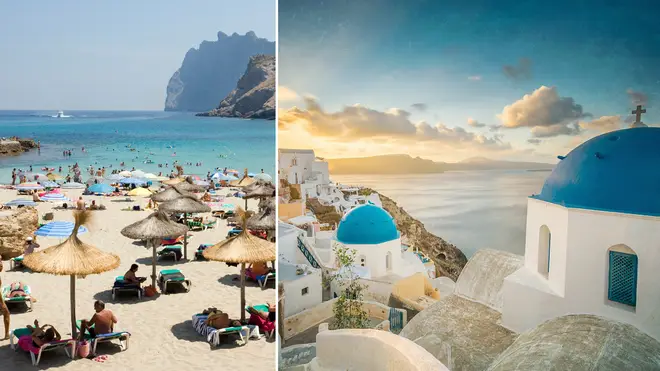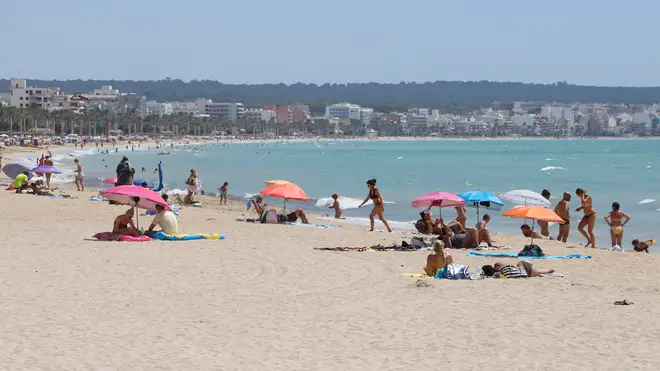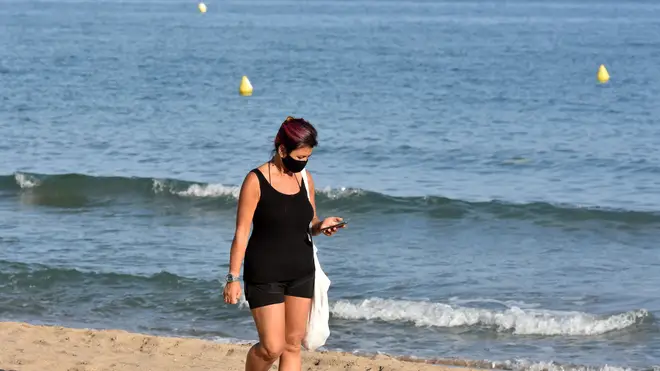Can I go on holiday to amber list countries?
19 May 2021, 15:50

What are the rules on going on holiday to countries on the amber list?
Since Monday May 17, most countries in the world have been on the UK's 'amber list' in the traffic light system of foreign travel.
Anyone returning to the UK from these countries will need to quarantine for 10 days on their return, and pay for two coronavirus tests on days two and eight of the self-isolation period.
Countries on the amber list include popular European destinations like Spain, Greece, and France - and many people have been wondering what the rules are on going on holiday to these destinations.
Here's your need-to-know...
Can I go on holiday to amber list countries?
While travel to amber list countries is legally allowed, the government is advising against non-essential travel to these.
Earlier this week, Boris Johnson warned the public that they should not be holidaying in these countries, saying: "I think it's very important for people to grasp what an amber list country is: it is not somewhere where you should be going on holiday, let me be very clear about that.
"And if people do go to an amber list country, they absolutely have to for some pressing family or urgent business reason, then please bear in mind that you will have to self-isolate, you'll have to take tests and do your passenger locator form and all the rest of it."
Transport Secretary Grant Shapps previously said “you should not be travelling to these places right now”, and Health Secretary Matt Hancock said you should not travel to these countries "unless it’s absolutely necessary, and certainly not for holiday purposes".
Mr Hancock said in a recent radio interview: "The red and amber list countries are places that you shouldn’t go to unless you have an absolutely compelling reason."

When asked why travel to amber list countries was not illegal, the Prime Minister's spokesman said: "Our advice is that no one should be travelling to amber countries, that’s in the interests of public health.
'There may be unavoidable, essential reasons for which people still have to travel to amber list countries, that’s why the rules are there.
"It’s right to have this three-tiered approach because there are some limited circumstances where – for unavoidable work reasons, for example – it’s necessary to travel to these amber list countries, where we know there are concerns but don’t have specific instances of variants of concern."
What's more, many amber list countries - including Spain and France - aren't yet allowing tourists from overseas.
What are the rules on travel to amber list countries?
If you do visit an amber list country, there are a strict set of rules you must stick to.
You must quarantine for 10 days after arriving in the UK from an amber list country. You are allowed to spend this quarantine period at home, or wherever you are staying.
You must bring a negative Covid test (completed within the last 72 hours) with you to border control when arriving in the UK, or risk a fine. You must also complete a passenger locator form.
Visitors coming from amber list countries must also book and pay for Covid tests to take on days two and eight of your 10 day quarantine period.

Most travel testing kits cost between £170 and £240 each, and there are a list of approved sellers on the gov.uk website.
People who arrive from amber list countries in England will have the option to make use of the ‘test to release’ scheme, which allows people to finish their quarantine on day five if they receive a negative test then.
Those taking part in the scheme will have to pay for an extra private test, and also take another one three days after completing it on day five.
Before travelling to any country, you should always check on that country's rules on overseas visitors.
What countries are on the amber list?
The following countries are on the amber list:
Afghanistan
Akrotiri and Dhekelia
Albania
Algeria
Andorra
Anguilla
Antigua and Barbuda
Armenia
Aruba
Austria
Azerbaijan
The Bahamas
Bahrain
Barbados
Belarus
Belgium
Belize
Benin
Bermuda
Bhutan
Bonaire, Sint Eustatius and Saba
Bosnia and Herzegovina
British Antarctic Territory
British Indian Ocean Territory
British Virgin Islands
Bulgaria
Burkina Faso
Cambodia
Cameroon
Canada
Cayman Islands
Central African Republic
Chad
China
Comoros
Congo
Cook Islands
Costa Rica
Côte d’Ivoire
Croatia
Cuba
Curaçao
Cyprus
Czech Republic
Denmark
Djibouti
Dominica
Dominican Republic
Egypt
El Salvador
Equatorial Guinea
Eritrea
Estonia
Fiji
Finland
France
French Polynesia
Gabon
The Gambia
Georgia
Germany
Ghana
Greece (including islands)
Greenland
Grenada
Guadeloupe
Guatemala
Guinea
Guinea-Bissau
Haiti
Honduras
Hong Kong
Hungary
Indonesia
Iran
Iraq
Italy
Jamaica
Japan
Jordan
Kazakhstan
Kiribati
Kosovo
Kuwait
Kyrgyzstan
Laos
Latvia
Lebanon
Liberia
Libya
Liechtenstein
Lithuania
Luxembourg
Macao
Madagascar
Malaysia
Mali
Malta
Marshall Islands
Martinique
Mauritania
Mauritius
Mayotte
Mexico
Micronesia
Moldova
Monaco
Mongolia
Montenegro
Montserrat
Morocco
Myanmar (Burma)
Nauru
Netherlands
New Caledonia
Nicaragua
Niger
Nigeria
North Korea
North Macedonia
Norway
The Occupied Palestinian Territories
Palau
Papua New Guinea
Pitcairn, Henderson, Ducie and Oeno Islands
Poland
Réunion
Romania
Russia
Samoa
San Marino
São Tomé and Príncipe
Saudi Arabia
Senegal
Serbia
Sierra Leone
Slovakia
Slovenia
Solomon Islands
South Korea
South Sudan
Spain (including the Balearic and Canary Islands)
Sri Lanka
St Kitts and Nevis
St Lucia
St Martin and St Barthélemy
St Vincent and the Grenadines
Sudan
Sweden
Switzerland
Syria
Taiwan
Tajikistan
Thailand
Timor-Leste
Togo
Tonga
Trinidad and Tobago
Tunisia
Turkmenistan
Turks and Caicos Islands
Tuvalu
Uganda
Ukraine
United States
Uzbekistan
Vanuatu
Vietnam
Wallis and Futuna
Western Sahara
Yemen

The PM confirms that people can 'make their own choices' about hugging on May 17th
NOW READ:
When is the next green list review?

































